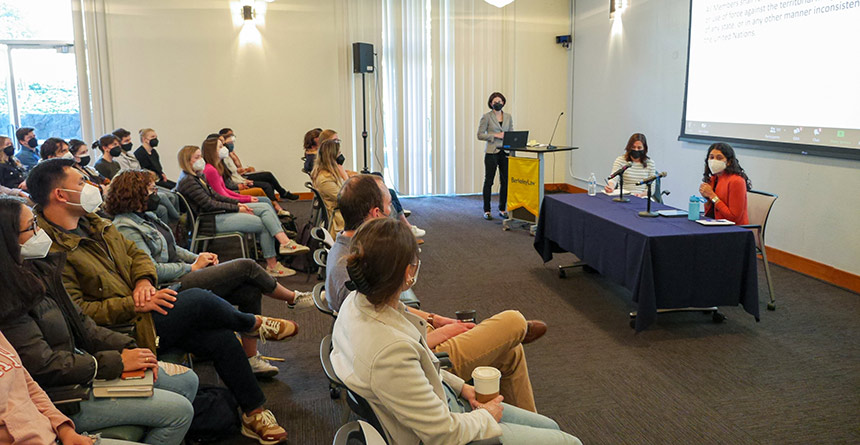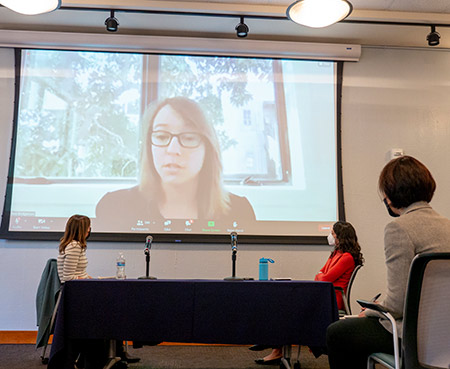As the World Watches Ukraine, Berkeley Law Experts Discuss Recent Events and What to Expect

Russia’s late February invasion of Ukraine shocked much of the international community, which has quickly responded with sanctions, condemnations, and deliveries of military and humanitarian supplies. Russian President Vladimir Putin has ratcheted the tension even further, putting his nuclear forces into a heightened alert status that stirred echoes of Cold War brinksmanship.
So far, U.S. President Joe Biden has taken the path of de-escalation, and his administration and other global leaders have pushed a package of intense sanctions aimed at squeezing Russia to relent.
As the fighting in Ukraine continued Feb. 28, some of Berkeley Law’s international law experts gathered to discuss the legal and strategic implications of what’s happened — and what might come next. The hybrid roundtable drew a crowd in person and online and was moderated by Berkeley Law Professor Katerina Linos and co-sponsored by the office of Dean Erwin Chemerinsky and the school’s Miller Institute for Global Challenges and the Law, where Linos is the co-faculty director.

Berkeley Law lecturer Tess Bridgeman, co-editor-in-chief at the online forum Just Security, said Putin is counting on the decline of democracy, and what the international community does now will prove him wrong — or not.
“With Russia’s invasion of Ukraine raising existential questions about the global international legal order, the strength and stability of our own democratic institutions are being tested and they’re arguably much more important than ever,” she said. “They are a bulwark against domestic authoritarianism, but also international authoritarianism.”
Bridgeman called the quick moves to impose sanctions, including blocking Russian banking processes and ousting Russian airlines from European airspace, a major step demonstrating unity and resolve. They also won’t be costless to the nations imposing them.
“These are only possible when acting from a position of legal and moral strength,” Bridgeman said. “So democracies rallying together to impose these kinds of costs on Russia hopefully can help be a form of strengthening our own democratic institutions and the unity of democratic governments in the face of rising authoritarianism — exemplified by this Russian invasion, but certainly not the only example of it that we face right now.”
What can these democracies do? Bridgeman outlined three categories of responses. The first, “naming and shaming,” means isolating diplomats and other officials, making it clear that “these are the actions that make you a pariah state,” she said.
The second is raising the material costs to Russia, including sanctions and bans on exports from Russia. The third is affirmative steps to counter the aggression, ranging from direct military support to humanitarian aid.
“None of these, of course, will be a silver bullet. None of them will work overnight,” Bridgeman said. “The goal over time is that in combination, these types of actions can deny Russia’s ability to sustain its unlawful invasion, and can build an international bulwark against future aggression by Russia or other states that would be poised to take similar actions.”
Watching the U.N.
Berkeley Law Professor Saira Mohamed laid out the international law landscape. What Russia has done flatly violates the United Nations charter, she said. Its prohibition of the unprovoked use of force, enacted in the aftermath of World War II and the dawn of the Cold War, is “really the central rule of international law,” she said.
Related Campus & Community News
Dania Matos to Ukrainian students, scholars: We stand with you(opens in a new tab) (by UC Berkeley Public Affairs)
“When it was written into the U.N. charter, it represented not just a rule on the use of force, but a change in the nature of military force — a shift from an acceptance of its use as an instrument of foreign policy to an expectation that military force must not be used in that way,” Mohamed explained. “And it’s a change in the character of military force, from this instrument of foreign policy to an instrument that’s supposed to be only used in the common good.”
The charter provides only two ways to justify military force: A vote authorizing it by the U.N. Security Council and in a situation where a nation is attacked, she said.
Russia has claimed self-defense validated its move into Ukraine through the recognition of the separatist-controlled regions of Donetsk and Luhansk as independent republics.
“There is no question that this is absolutely a nonsense claim, that these are not independent countries,” Mohamed said. “Russia cannot recognize these as independent countries in a way that’s consistent with international law.”
Russia’s secondary argument, that there are humanitarian grounds for moving into Ukraine, still requires a Security Council authorization, she said. Putin is playing something of a both-sides game with this assertion, she added, since other U.N. countries have intervened elsewhere without authorization. The most glaring example is the U.S. invasion of Iraq in 2003, which happened without a Security Council vote.
So what can the U.N. do in response to Russia’s invasion? Not much, Mohamed said, largely because Russia is one of the Security Council’s five permanent members and has the right to veto any move the council tries to authorize. Russia isn’t obligated to recuse itself or otherwise refrain from involvement in any attempt to stop or punish it.
“This isn’t a mistake on the part of the drafters — this was intentional,” Mohamed said. “The U.N. charter wasn’t trying to avoid power politics, it was institutionalizing them.”
A procedural effort to at least allow the Security Council and General Assembly to voice condemnation of Russia’s actions is also underway, she said.
Tracking cyberwarfare and disinformation
Elena Chachko, a Miller Institute fellow, said in her view, the heavy political blowback from America’s wars in Afghanistan and Iraq sparked something of a retreat from large-scale military commitments.
“And so there’s very little appetite for another large-scale military intervention that may bog the U.S. down for years to come and have unanticipated consequences,” she said. “This is especially true when a nuclear power like Russia is involved, because the potential for escalation is enormously great.”
That may mean a strong reliance on cyberattacks, and both the U.S. and Russia have enormous resources at their disposal. Biden has said that his administration won’t deploy cyberattacks unless Russia strikes first, and any tactics that have real-world consequences — such as disrupting physical infrastructure — run the risk of violating the U.N. ban on the unauthorized use of force. So far, Chachko said, the U.S. has signaled it will stay on the legal side of that line.
“When you engage in this kind of cyberwarfare, you have to take on the risk that the other party, in this case Russia, will launch similar offensive cyber action against you,” she said. “And I think that is a major reason why we’re seeing so much care and so much hesitancy from the Biden administration.”
Lindsay Freeman(opens in a new tab) of Berkeley Law’s Human Rights Center (HRC) discussed two other types of cyberattacks: Information warfare and technology warfare. The first involves the deliberate spread of misinformation, often using widely-used platforms such as Facebook and Twitter. The second entails hacking into systems used by civilians, not the military or government.
“In past conflicts, there’s been misinformation and disinformation coming out. But the sophistication of Russia’s information warfare apparatus is different than anything we’ve seen before. Ukraine and other countries as well are doing the same thing and fighting the warfare back,” said Freeman, director of law and policy for the HRC’s Tech and Human Rights Program. “So on all sides, you have this mix of information coming out, which makes it incredibly hard as a war crimes investigator to verify the information to try and establish the facts of what’s actually going on.”
One recent example is the dispute over what happened to a group of Ukrainian soldiers on Snake Island. An audio recording of one of them defiantly refusing to obey a Russian warship’s command to surrender went almost instantly viral, paired with the news that all the soldiers had been killed. The Russians quickly put out a video allegedly depicting the soldiers surrendering, muddying the waters.
“How do you fight disinformation, but also deal with the volume of information — because honestly, it’s drinking like a fire from a firehose right now,” Freeman said. “How do you actually organize the information? What do you collect, what needs to be preserved? How should it be organized, to be used as evidence later in the courtroom? These are things that are being worked on, and it’s still an evolving field.”
The HRC’s Investigations Lab(opens in a new tab) has been a leader in that progression, pioneering methods for sifting through open-source information — including social media — as part of human rights investigations. In 2020, it released the Berkeley Protocol on Digital Human Rights Investigations in partnership with the U.N. Human Rights Office, which is a roadmap for investigators.
Berkeley Law students and students from the broader UC Berkeley community work with the lab. Some are from conflict areas, including Ukraine, Freeman said, adding to the emotional toll of the work.
“We’ve developed a lot on resiliency, which is a huge focus, and secondary trauma, which I think is particularly acute in our current environment where so much information is coming at us,” Freeman said.
It remains clear, Bridgeman said, that nobody wants a shooting war with Russia over this, particularly not the U.S. But she emphasized that despite chatter to the contrary, there is no way for Biden to bypass Congress and involve American troops in such a conflict.
What remains devastatingly unclear, she said, is how to resolve the perilous situation.
“The big question then is can we find off-ramps for Putin — and even if we do, will he take them?” Bridgeman said. “So it’s hard to see, unfortunately, right now, what a mutually agreeable solution will look like. It’s hard to see what kinds of hard compromises each side would be willing to make.
“But that’s the type of solution that is clearly in the national security interest of the United States and all states involved — and, in fact, for the broader global community.”
